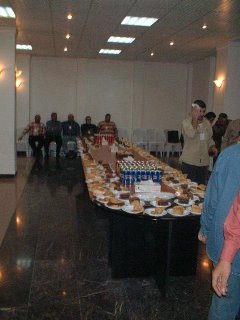A Baghdadi Christian asked me if I thought he should immigrate from Iraq to the US. He had reason to believe that a Green Card was imminent. His source was not a sham website that requires users to pay money for access, which on occasion Iraqis have asked me about. Instead, he had official correspondence from the American embassy.
Should he start a new life in the US? He asked me as if I really really had some important insight on the subject.
I paused, thinking about how to answer this. I responded with pragmatic questions, avoiding the issue of whether Iraq had a future or not. "Are you sure that you can make it in the US?" "Are you ready for the adjustment?" "Do you know what sort of work you want to do?" He was confident that he could live in the US, and that the adjustment would not be difficult. He speaks decent English and knows computers. He has some, but not many, distant relatives who live in the states. He might settle near Detroit, probably in Dearborn.
My own thoughts on the future of Iraq are nebulous. I see it as unlikely that it will significantly exceed the performance of any of its neighbors. The best case scenario may be that it will become a country like Jordan. It will have a stable government that has support from the people, and a decent economy that is integrated to the region. There is a significant risk of a coup resulting in a government like Syria's, or an Islamic government similar to Iran.
The question is in some ways like asking me if I should be in Iraq. I'm working here on rebuilding the country, and if I believe progress is impossible, shouldn't I pack up my bags and go home? Who wants to participate in an exercise in futility? This is why I didn't give him a direct answer. My private response is that even if Iraq has an uphill battle ahead that it may lose, that does not change the fact that our work does help the Iraqi people. This help is needed, regardless of the long-term trajectory of the country. But I didn't want the rest of the Iraqi staff to know that I had significant doubts about the future of the country as a whole.
He felt that Iraq had the trappings of a great country, such as a strong agricultural base and oil. It might be a mistake to leave that behind. As I talked to him more, he was more concerned about missing out on the Baghdad Stock Exchange. An Iraqi bank has shares which sell for less than 100 ID (1500 Iraqi Dinar = US Dollar) and a significant stake is about to be purchased by HSBC. How could he leave that opportunity behind? He already owns thousands of shares, and since only Iraqis can own stock, he would have sell his holdings. He also asked if I thought the Iraqi Dinar would strengthen against the dollar. I forget how the conversation ended. I remember mentioning the risk of insider trading.
We still keep in touch. It looks like he will immigrate.

